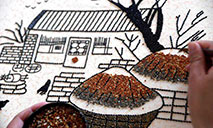Bruised by coronavirus, Slovenian boatmen restore "pletna" for tourist comeback
Gregor Pazlar rows a "pletna" boat in Bled, Slovenia, March 13, 2021. Every off season, Slovenian boatmen take the "pletna" rowing boat out of Lake Bled, a famous resort shining like a sapphire outside Liubljana, the country's capital. They then disassemble the wooden boats, refurbish each piece, and put them together again, ready for the next ride. The process helps the hand-made vessel last up to 30 years. (Photo by Zeljko Stevanic/Xinhua)
LJUBLJANA, March 16 (Xinhua) -- Every off season, Slovenian boatmen take the "pletna" rowing boat out of Lake Bled, a famous resort shining like a sapphire outside Liubljana, the country's capital.
They then disassemble the wooden boats, refurbish each piece, and put them together again, ready for the next ride. The process helps the hand-made vessel last up to 30 years.
When local business were bruised by the COVID-19 outbreak, as evident in a 60-percent drop in tourist visits last year, restorations kept going the same way as they have for hundreds of years.
"We hope we will have a better season," said Gregor Pazlar, president of the Bled Boat Association, noting that boatmen have prepared themselves to resuming services in early April.
Pletna is a passenger flat-bottom boat which can date back to 1590. A pointed bow, a wider stern and two oars distinguishes the pletna from gondola, the Venetian rowing boat.
For generations, rowing pletna has been a family business and a highly respected profession in Bled's lakeside villages. The oarsman employs a unique rowing technique as "stehrudder" in which they stand facing more than a dozen of passengers while rowing with two oars.
As few as 23 local households, nowadays, operate the only 23 vessels for a shuttling tour to a castle on a small island overlooking the lake.
It takes 600 hours of work or "a few months" to build up a pletna from scratch, said boatmaker Anze Logar, one of the four people worldwide who master the techniques.
A frame takes around 120 hours, the interior, oars, benches and the roof take around 200 hours, and painting usually needs another 200 hours.
"For good quality boats, we need good quality material. All our boats are made of Larix, our traditional, authentic Slovenian wood that grows up high in the mountains," Logar explains.
Each year, Logar recruits two or three younger men interested in pletna-making and gives them hands-on instructions, he added.
"We need to renovate the surface of a pletna every season because of damage and weather conditions, and if you really take good care of them, they can last 25 to 30 years," Logar said.
Throughout his boatmaking career, Logar has built six pletnas and up to 45 other boats.
"There is a long waiting list for making a new pletna boat because it is a long process," he said, adding that rowers usually have to wait around two years since boatmakers are always multi-tasking.
In this regard, Logar sees the COVID-19-caused halt in tourism an opportunity to have more time to clear his order backlog.
The COVID-19 pandemic has had an unprecedented impact on people's livelihood in Bled, a town adjoins the lake, said Pazlar, president of the Bled Boat Association.
One of the best seasons came in 2019, with a record amount of foreign guests, whereas 2020 was the complete opposite, as tourist visits drop by 60 percent, especially those from afar.
"We normally get over 30 percent of the tourists from Asia," said Pazlar.
"I really hope this year will be better. Last year we didn't have any arrangement with tourist agencies, but they started contacting us again this year, though only from neighboring countries," he said.
He said it needs at least five years for situation to get back to the same as in 2019, when each pletna runs full-load shuttle four to seven times a day.
Last year, only half of the 23 boats were on duty, providing one or two rides every other day, he said.
To some rowers, this feels like an unusually lengthy off season, said Pazlar, noting that each year rowers give only six-month of full time services due to the climate.
During the pandemic, rowers earned some pocket money by doing odd jobs. "I have a small farm. In the old days, all the workers on the boats were farmers, so we are still maintaining this tradition," he said.
Still, being one's own boss in the captivating beauty of nature while meeting people from all over the world -- "this is the best office in the world," said Pazlar.
"About two years ago I had guests on the boat from 7 different countries and 4 different continents," he said proudly, adding that people from America, Oceania, Asia and Europe gathered in one pletna trip to the island.
As to Logar, building pletna is "a way of life." He is determined to pass down the tradition in his family and intends to have more people trying their hands at boat-making.
"We want to save this disappearing heritage on a national level," he said.
 |
Photos
Related Stories
- Europe Coronavirus Updates: UK, Portugal and Slovenia report highest daily spike in coronavirus cases
- China's top political advisor vows closer ties with Slovenia
- Chinese vice premier calls for closer China-Slovenia cooperation
- Chinese vice premier meets Slovenian leaders on ties
- Slovenia make compensation for cancelling 2013 Universiade
- Slovenia calls for NATO expansion in Western Balkans
- Fitch downgrades Slovenia's credit rating to BBB+
- Slovenia capable to overcome financial crisis: French minister
- Slovenian coalition government loses further parliamentary support
- Slovenia kicks off presidential run-off
Copyright © 2021 People's Daily Online. All Rights Reserved.











